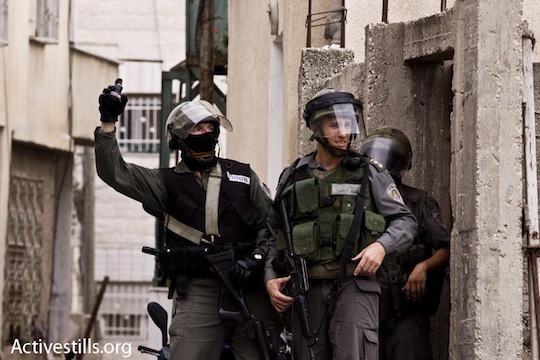The presence of Israeli security forces around Al Quds University in Abu Dis has led to clashes with students twice in the past week. Israeli forces, who have used rubber-coated bullets and tear gas, are trying to provoke the students, the university’s executive vice president claims.
Yesterday, while I was teaching my 9:30 a.m. composition class at Al Quds University in Abu Dis, I heard the crack of rubber-coated bullets being fired outside. A few of my students jumped in their seats. Eyes wide, they looked at me for a cue. I continued teaching, although I saw students running past the window and the hallway next to my classroom was soon full of students coughing from the tear gas they’d inhaled outside.
As I was inside teaching, I didn’t see firsthand how the clashes began. But according to Ma’an News Agency, “[an] Israeli border police patrol stopped and searched several students at the main gate of the university in Abu Dis, inspecting identity cards and detaining several students for over an hour.”
When Israeli forces then tried to enter the university, which is located in Area B, staff stopped them. As the staff is unarmed, it is safe to assume that they used nonviolent means to prevent the armed Israelis from going on campus. Israeli forces then fired tear gas and rubber coated bullets at the school. Dozens of students suffered from gas inhalation; Ma’an also reported that eight were treated at the Abu Dis Emergency Center after they were hit by rubber-coated bullets.
This was the second time in less than a week that Israeli soldiers came to campus, causing clashes to break out at Al Quds University. Last Wednesday morning, as I walked in a side gate around 9:30 a.m., I heard rubber-coated bullets being fired. Inside the campus, I found students choking and coughing from tear gas and crowding the hallways of a building as they sought refuge from the clashes between heavily armed soldiers and a small number of youth who had nothing but stones.
Speaking to Ma’an, Al Quds University Executive Vice President Imad Abu Keshik said, “Israeli forces claim that they are stationed near [the] Al Quds University campus to oversee construction and maintenance work on the separation wall.” But I’m here at least four days a week and I pass the separation barrier on my way to and from campus, and I have not seen maintenance or construction of the portion of the wall that is near the university.
Abu Keshik sums it up: “Israeli forces are trying to provoke students and create a sense of instability around the campus.”
As someone who lived in Abu Dis for a semester and became well-acquainted with the village and its rhythms, I’ve seen that things often go like this: an army jeep enters the village, driving along a main road towards the university. Alarmed by the provocative intrusion of an occupying army, local boys and sometimes students throw stones at the armored vehicle. Soldiers stop the jeep, get out, and then “defend” themselves — which they wouldn’t “need” to do if they hadn’t entered in the first place.
***
It’s not just the university and its students that are under increasing pressure. Traveling between Bethlehem, Abu Dis, Jerusalem and Ramallah in recent weeks, it has been apparent that Israel has tightened the checkpoints in those areas. There is an increased military presence at some checkpoints that are usually only partially or barely manned. Soldiers seem to be stopping more people and inspecting more cars than usual. Palestinians and internationals who move through and in and out of the West Bank on a daily basis also report an increased military presence and a surge in flying checkpoints.
On my way from Abu Dis to Bethlehem on a recent Saturday, soldiers stopped the service taxi I was riding in at a checkpoint and proceeded to thoroughly search the vehicle and my bags. They did not ask for ID once I spoke English to them in an American accent and told them that I’m from Florida. However, my privileges did not extend to the people around me. The driver and the two other passengers — all Palestinian men — were told to hand over their IDs. The soldiers took them and walked away.
We then sat for approximately 40 minutes in the hot sun, the soldiers insisting that we keep both the doors and windows closed. I was ill (no, I shouldn’t have been traveling in my condition); when the driver understood just how sick I was, he got out of the boiling van and began pleading with the soldiers for a little bit of water. The soldiers, who had a cooler full of ice-cold water next to them on the bench, told him that if we could find a cup in the service taxi, they would give me some.
But we didn’t have any glasses in the service taxi and so the driver pushed some more. Finally the soldiers relented and gave him a cup of water, which he brought to me.
In the end, the soldier returned the ID cards to the driver and other passengers and we were all free to go. The purpose of the stop and detainment in the sweltering heat? It seemed to be nothing but harassment.
***
As a journalist who happens to hold a blue ID, the people around me expect me to have some insight into these events. They keep asking me why the Israelis keep coming to the university. And why have the checkpoints gotten tighter? And why the flying checkpoints? Is it connected to the holidays?
Unfortunately, I don’t have any answers. Our students are just people who want to get an education and who hope for a better future. They want to graduate and find jobs and have families. The overwhelming majority of the Palestinians moving about the West Bank and traveling to and from Jerusalem are just trying to go about their lives.



